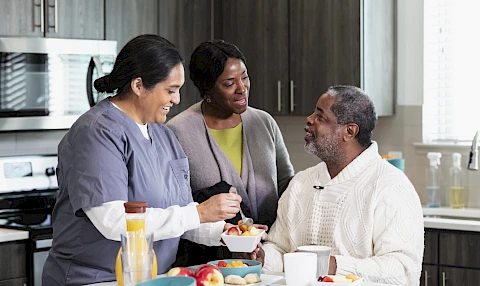
Vulnerability to foodborne illnesses increases as one ages, making food safety for seniors an essential consideration. At Senior Helpers Contra Costa, we know how National Food Safety Month is a vital prompt to review and adopt age-friendly practices in the kitchen, ensuring our meals remain nutritious and safe.
What are the Basics of Food Safety for Seniors?
Our immune systems change as we age, making us more vulnerable to infections. Chronic conditions like diabetes and kidney disease can also affect how our bodies handle food. Proper nutrition becomes necessary, and ensuring meals are good to consume is a big part of that.
Proper Food Storage
Correctly storing foods is a part of preventing illnesses. Here are a few tips to ensure your meals are not
- Maintaining a refrigerator temperature of 40°F or below and a freezer temperature of 0°F or below is essential.
- Store meats, dairy, and cooked leftovers in the refrigerator using airtight containers.
- Freeze foods that won't be consumed within a few days.
- Label all of your stored items with dates for easy tracking.
- To avoid cross-contamination, keep raw meat, poultry, and seafood separate from other foods.
- Use separate cutting boards and utensils, and wash hands, utensils, and surfaces after handling raw items.
Safe Reheating Practices
Proper reheating is crucial for meals to be safe to consume. Ensuring even heating and reaching the appropriate temperature helps eliminate harmful bacteria.
- Microwave Reheating: Cover food with a lid or wrap and stir halfway through to ensure even cooking. Use a food thermometer to verify an internal temperature of 165°F.
- Oven and Stovetop Reheating: Preheat the oven to 325°F and stir food frequently during stovetop reheating to avoid uneven heating.
- Temperature Verification: Ensure food is steaming hot throughout, as cold spots can harbor bacteria.
Common Misconceptions on Foodborne Illness Prevention
As food safety for seniors is crucial to prevent illness, it bodes well to be aware of common myths about keeping food fresh to make informed choices.
- Appearance and Smell: Food can be unsafe even if it looks and smells fine.
- Leftover Storage: Consume leftovers within 3-4 days to avoid bacterial growth.
- Room Temperature: Limit the time food sits out at room temperature to prevent bacterial multiplication.
Practical Tips for Caregivers
Family carers can help ensure elderly loved ones follow foodborne illness prevention practices. Here are some tips to remember:
- Regularly check expiration dates in the pantry and fridge.
- Educate older adults on food contamination prevention and explain why it's essential.
- Encourage safe food handling habits, like washing hands before and after handling food.
- Foster an environment where safety standards in handling food is a regular part of meal prep.
Get Kitchen Assistance for Food Contamination Prevention
Food safety for seniors is of paramount importance. Implementing proper storage, adhering to safe reheating practices, and correcting common misunderstandings are vital in preventing foodborne illnesses. At Senior Helpers Contra Costa, we are committed to assisting families in Oakland, San Ramon, Moraga, Orinda, Walnut Creek, and nearby areas to ensure their elderly loved ones remain safe and healthy. Reach out for support and collaboration to make every loved one's meal safe and enjoyable.